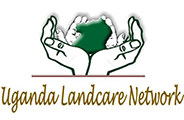Team Leader of the Uganda Landcare Network (ULN) Dr Joy Tukhawira and Mr Mathias Wakulira talk to Senior EverGreening Fellow, Dr Alan Channer, about evergreening in Uganda.
Groups of children wend their way through coffee and banana fields, their banter mingling with cock crows as the sun rises. And when they reach school, they lift the roof with a song. This is Masaka District, near Lake Victoria, home of ULN Secretary and programme coordinator Mathias Wakulira.
‘’It gives me so much joy to work here because this is where I grew up. The community has given me so much. 20 years later, I am giving back.’’
‘’The main aspect I work on,’ Wakulira tells me, ‘is children dropping out of school. Only about 35% of children sit for primary leaving examinations. Parents cannot afford school fees, so children have to go looking for money somewhere. We can’t stop this as such, but we can come into schools and equip children early enough with livelihood skills, such as farming and tree husbandry, that will sustain them in the future.
’’We call it ‘school community extension’, because whole households end up adopting Sustainable Land Management (SLM) practices that are learnt by the children – for example, how to manage a tree nursery; graft avocadoes and guavas, and inter-crop coffee and bananas with nitrogen-fixing and shade-giving indigenous species like Albizia coriara and Mvule (Milicia excelsa) or Musisi (Maesopsis eminii), which is fast-growing and provides good shade from the hot sun.’’
‘’ULN working with communities use a whole-landscape approach,’’ says Joy Tukahirwa, Team Leader of ULN. “It is an approach that is self-driven by the people, it benefits the communities and it spreads spontaneously after the formal projects have ended. I dare to call it a wonder. We now have a footprint across 40 districts of Uganda.
‘’I work a lot in the mountainous districts of south-west Uganda, such as Kabale on the border with Rwanda. It is very different to Masaka, with steep slopes and the problems of soil erosion with dense population densities. The main crops here are irish and sweet potatoes, sorghum, potatoes and beans.
‘’One factor that can make a huge difference to a rural family in Kabale is a cow. Milk raises nutritional levels for children, it brings income through selling of milk products for the family and the manure is used to fertilise the fields to boost yields. What we encourage to sustain ‘zero-grazing’ in these areas is the cultivation of fast-growing trees like Sesbaena sesbania and Calliandra, which provide nutritious fodder for the cows. We also encourage the integration in farms of various fruit trees such as guava and avocado and the indigenous medicinal timber tree Prunus Africana (African cherry), as well as fast-growing pine and Grevillea.
‘’It is sad that the indigenous forests have been reduced to remnants only in protected areas- Bwindi and Mugahinga national parks. We encourage domestication of indigenous trees and their conservation on farms outside protected areas where possible, and of course, people know the medicinal and other values of many indigenous species, but the pressure has been too great.’’
Pressure on the land is also being aggravated by climate change, maintains Wakulira. ‘’Weather conditions have become more unpredictable over the years that I have been observing. Droughts are longer, rainfall is more erratic and heavier when it comes. The cropping calendar is not what it used to be. There is always more work for us to do now.’
I asked Joy Tukhawira what motivates her to keep going.
‘’I have a rural background, raised on a small scale subsistence farm mixed farming; Over 20 years I worked for ICRAF as a research scientist, initially under the African Highlands Initiative (AHI) and later as part of the Uganda Country office; I specifically got very inspired by the Master Tree Growers (MTG) * programme when I visited and trained in Australia – all these have equipped me for my work today. But what really gives me satisfaction is to see smiling faces with a fresh harvest of fruits and vegetables also Landcare facilitators owning their work cheerfully. It just gives me that pleasure to see local solutions working.’’
ULN is comprised of over 600 functional self-driven Landcare groups across the country. These groups are characteristically voluntary based self-governed innovation platforms each addressing local challenges mobilized under a collective action approach. One of ULN success story is a Junior Landcare programme fast growing in many primary schools equipping young school child with skills to give them a future even after school drop out. Over the last five years, ULN has steered a programme scaling Sustainable Land Management
( SLM) in Northern Uganda including documenting SLM practices setting up demonstration sites and building the capacity of extension agents to steer SLM across scales. On December 30th 2020, the _ULN launched a curriculum on sustainable land management for use in tertiary institutions across the country, in partnership with the Ministry of Agriculture and other agencies. The launch was officiated by the Minister of Agriculture, Hon. Bagiire Aggrey and featured on national television. Currently, ULN is developing a Climate-Smart Agriculture (CSA) training package to roll out among small scale farming communities working with Local government authorities to institutionalize resilience at farm and community level amidst climate change threats,
In 2021, the Uganda Landcare Network will partner with Catholic Relief Services and World Vision in the Global EverGreening Alliance’s six-country ‘Restore East and Southern Africa’ programme, to scale up EverGreen Agriculture across Uganda, Kenya, Ethiopia, Malawi, Tanzania and Zambia. The aim of the programme is to reach over one million farming households.
